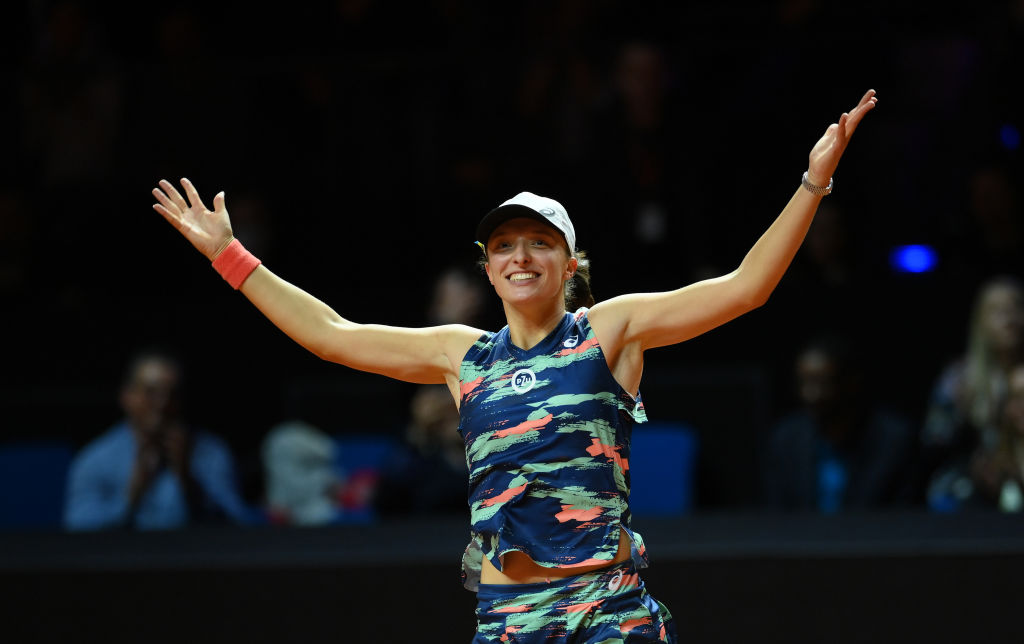The rise and rise of tennis’ No1 superstar Iga Swiatek

When your father is an Olympic rower, a future in sport might almost be expected – if not demanded.
But even Tomasz Swiatek, a quads rower for Poland at the Seoul 1988 Olympics, couldn’t have expected his daughter, Iga, to be a tennis Grand Slam winner and world No1 before her 21st birthday.
Women’s tennis is in bloom. The last 10 Grand Slams have seen eight different winners, five of whom were first-time winners.
Since Serena Williams’ reign of domination came to a halt back in 2017 in Australia, 13 different women have picked up one of the four annual showpiece calendar events.
One of those, at the age of 19, was Swiatek. Her French Open triumph in 2020 marked the beginning of an era in her career that has only seen her grow and grow.
Born in 2001 to an Olympic athlete of a father and an orthodontist mother, Iga and her sister Agata were both pushed on a path to sporting success.
But while Agata later followed her mum’s career path into dentistry, Iga pursued professional tennis.
The village of Raszyn, where Iga grew up, is occupied by fewer than 7,000 people and is a minuscule neighbour to the capital city Warsaw, which sits just 9km away.
It was first known for having Europe’s largest aerial transmitter mast, then soap actress Monika Labendowicz, and now for Swiatek, 20 – one of the most consistent tennis players on the circuit.
Breaking and Entering
She broke into the world’s top 50 within months of turning 18 after winning her first WTA event and going on a run to the fourth round of the French Open – the Grand Slam she had won at junior level two years earlier and the event she would go on to win at senior level 12 months down the line in 2020.
Swiatek overcame seeded Marketa Vondrousova, who had made the final a year prior, in 2020 before toppling four-time doubles Grand Slam winner Hsieh Su-wei in straight sets.
She’d breeze past wild card Eugenie Bouchard before losing just three games in a straight sets win over No1 seed Simona Halep.
Swiatek had arrived, and it was just the fourth round.
Tennis, more than many sports, is about the luck of the draw.
You know which of the top four seeds is in your quarter; whether you’ll face them is a different question.
Swiatek could have faced second, third or fourth seeds in Karolina Pliskova, Elina Svitolina or Sofia Kenin in the latter stages of the tournament but only came across American Kenin in the final after beating qualifiers Martina Trevisan and Nadia Podoroska in the quarters and semis.
Swiatek the teen sensation
Swiatek became the first teenage Grand Slam champion at Roland Garros with a 6-4, 6-1 win over Kenin.
She didn’t concede a set on the road to her triumph and didn’t lose more than five games in any given match in the French capital – an astonishing feat for someone so young.
“After Roland Garros, I felt my whole world had turned upside down,” she wrote this year.
“The first few months were hard in balancing my tennis work and off-court responsibilities.”
We have seen similar with Emma Raducanu since the Briton won the US Open last year.
She endured criticism from many outside of the sport, including England rugby head coach Eddie Jones, for leaning into the celebrity of being a young, successful athlete.
“After winning a Grand Slam you might think ‘I can now be happy for the rest of my life’ but it is totally the opposite to that.
“I wasn’t aware it would be like that,” Swiatek added.
“I expected a lot from myself and wanted to show people that I could play like that all of the time. It was kind of impossible.
“So I needed some time to chill out a little bit.
“I had to just remember ‘I’m 20 and still have lots of time to develop and to learn’.
“Winning a Grand Slam is great but I think at my age it interrupted the peaceful process of growing up and developing my game.”
Out in front
Despite writing that passage early this year before going on a run to the Australian Open semi-finals, Swiatek has become the first woman to win the opening three WTA 1000 events of the calendar year.
She went unbeaten in Dubai, Indian Wells and Miami to reach world No1 – as a result of Ashleigh Barty’s shock retirement from the sport – and could cement her place as the best in the world when she heads to Madrid later this week for the next 1000 event, the first on clay of the season, having triumphed on that surface on Sunday in Germany to extend her winning streak to 23 matches.
From an upbringing of expectation, Swiatek has so far delivered.
And in the world of modern sport, being consistently the best is one of the profession’s most important attributes.
But in the 20-year-old, tennis may have found its new superstar. Swiatek’s road from humble beginnings in Poland to worldwide success in a matter of years has been astonishing. Now comes the pressure of being at the top – and trying to stay there.